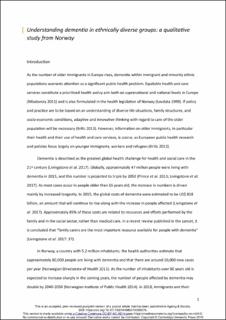| dc.contributor.author | Sagbakken, Mette | |
| dc.contributor.author | Spilker, Ragnhild Anne Caroline Storste | |
| dc.contributor.author | Ingebretsen, Reidun | |
| dc.date.accessioned | 2021-01-12T20:05:15Z | |
| dc.date.accessioned | 2021-02-25T09:09:32Z | |
| dc.date.available | 2021-01-12T20:05:15Z | |
| dc.date.available | 2021-02-25T09:09:32Z | |
| dc.date.issued | 2019-05-27 | |
| dc.identifier.citation | Sagbakken M, Spilker RACS, Ingebretsen RI. Understanding dementia in ethnically diverse groups: a qualitative study from Norway . Ageing & Society. 2019:1-24 | en |
| dc.identifier.issn | 0144-686X | |
| dc.identifier.issn | 1469-1779 | |
| dc.identifier.uri | https://hdl.handle.net/10642/9730 | |
| dc.description.abstract | As the number of older immigrants in Europe rises, dementia within minority ethnic populations warrants attention as a significant public health problem. Equitable health and care services constitute a prioritised health policy aim on both supranational and national levels in Europe and is formulated in the Norwegian health legislation. Through interviews and focus groups with older immigrants, relatives of immigrants with dementia and health personnel, we explored the perceptions of dementia among ethnically diverse groups in Norway. The findings show that many interpret symptoms such as memory loss and disorientation as a natural part of ageing. Others consider dementia symptoms to have a psycho-social origin, deriving from social isolation. Some describe symptoms as an expression of a potentially transient sign of madness, while others point to destiny and God's will, representing basic and unalterable causes. However, another pattern of perception includes viewing dementia as a potentially transient physical illness, including a belief in a medical cure. By investigating how people with dementia and their families understand and manage the condition, one may facilitate access to relevant and adapted information. Furthermore, by exploring how people relate to their illness, health personnel may challenge explanatory models that create unrealistic expectations of cure, as well as models that, due to stigma or normalisation of symptoms, prevent the use of public care. | en |
| dc.language.iso | en | en |
| dc.publisher | Cambridge University Press | en |
| dc.relation.ispartofseries | Ageing & Society;Volume 40, Issue 10 | |
| dc.rights | Creative Commons Attribution-NonCommercial-NoDerivatives 4.0 International (CC BY-NC-ND 4.0) License | en |
| dc.rights.uri | https://creativecommons.org/licenses/by-nc-nd/4.0/ | |
| dc.subject | Dementia | en |
| dc.subject | Cognitive impairments | en |
| dc.subject | Perceptions | en |
| dc.subject | Management | en |
| dc.subject | Diversities | en |
| dc.subject | Minority ethnic groups | en |
| dc.title | Understanding dementia in ethnically diverse groups: a qualitative study from Norway | en |
| dc.type | Journal article | en |
| dc.type | Peer reviewed | en |
| dc.date.updated | 2021-01-12T20:05:15Z | |
| dc.description.version | acceptedVersion | en |
| dc.identifier.doi | https://doi.org/10.1017/S0144686X19000576 | |
| dc.identifier.cristin | 1693669 | |
| dc.source.journal | Ageing & Society | |

